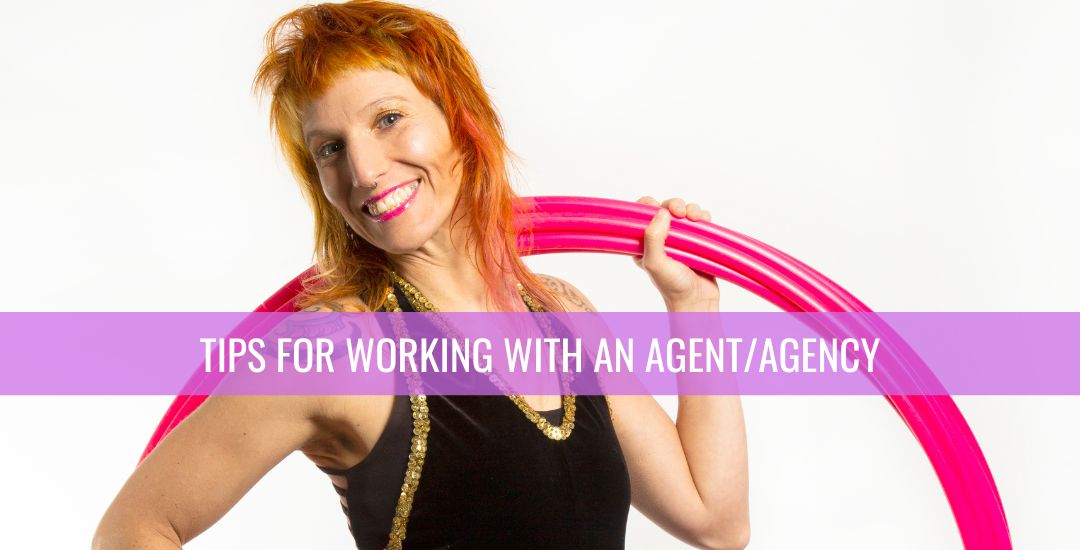Working with an agency can be a fantastic way to showcase your skills, connect with clients, and secure consistent gigs. However, navigating the agency landscape can be daunting, especially if you’re new to the scene. That’s why we’ve put together some valuable tips to help you make the most out of your partnership with an agency.
Why work with an agent/agency?
By working with a performance agent or agency, you gain access to a wider range of opportunities. Agents often have established relationships with event organisers, entertainment venues, and production companies. This means they can connect you with gigs and projects that you may not have been able to access on your own, especially when starting out. This increased visibility can lead to more consistent work.
Agents will also handle administrative tasks such as contract negotiations, scheduling, and logistics. They can provide valuable guidance and support while helping you navigate the industry, and make informed decisions about your career trajectory.
Performance agents and agencies often have a wealth of industry expertise and networking connections. They understand the ins and outs of the entertainment industry; including market trends, industry standards, and best practices. By leveraging their knowledge and connections, agents can help you maximise your earning potential and expand your professional network. Whether it’s securing high-profile gigs, more gigs, collaborating with other artists, or exploring new opportunities; working with a performance agent or agency can open doors to exciting possibilities.
Tips for working with a circus performance agent/agency
Financial:
When it comes to the financial side of working with an agent/agency it is important to be on top of things.
Be sure to provide your bank details and superannuation details clearly.
Super details:
- Legal Name
- Address
- DOB
- TFN
- Super Fund ABN
- Super Fund USI (if relevant)
- Super Fund Member No.
Invoices
When you submit your invoice to the agent it must include your ABN, and an Invoice Number.
It is generally considered best practice to send this through as a PDF, and not an editable word document.
Please also check that the payment terms of your invoice align with your contract with the agent/cy.
Invoicing must do’s:
The ATO (Australian Tax Office) requires invoices to include:
- Use the words ‘Tax Invoice’ if you ARE registered for GST
- Do NOT use the word ‘Tax Invoice’ if you are NOT registered for GST. Just write “Invoice” instead
- Business name and/or your name (if you are a sole trader)
- ABN
- Date the invoice was issued
- Brief description – for example, this could be the date and location of the gig as well as what you did:
29 April, Melbourne CBD, 3 x 40 minute roving sets
Insurance & Checks
You must have Public Liability Insurance. An agent will not book you if you don’t have your own insurance and, if you are performing with fire, you must ensure that your insurance policy includes fire. If you intend on working with or around people under 18 years old, your agent will require you to have an up-to-date Working With Children’s Check. You will need to provide them with a copy and/or your Working With Children Check number and expiry date. For some gigs, you may also be required to supply a Police Check.
Promotional:
To be able to pitch you for jobs and get you work, an agent needs to be provided with materials they can use. Make it easy for them!
Put together a basic folder of information so you have everything ready to go when someone is interested in your services. At the bare minimum, it needs to include:
- Short bio
- 2 professional promo images
- Public Liability Insurance
- Working With Children’s Check
- Superannuation details
- Rates sheet
And should also include:
- Short blurb about your act, roving character/skills, workshop description
- 1-2 high-quality videos that show your skills and/or act
- Showreel (if you have one)
Hot Tips for Images & Videos:
- Make sure they’re high-quality
- In your professional promotional images you should be fully clothed and shoed.
- Photos of you spinning a prop at the back of a dance floor is not suitable promo material
- Avoid providing grainy low quality videos
- Screen any video audio before sending, overdub with music if necessary, or just remove the audio
You are representing an agent
It is important to also keep in mind that when you are hired for a job, you are not just representing yourself but also the agent/agency. Avoid self-promoting your services or offering additional services or alterations to a job you have been booked for. If the client asks you to do something extra/different to what you have been booked to do, let the client know you’ll need to check in with the agent/cy first and then give them a call to check-in. A big one here to keep in mind is if a client starts to speak to you about future opportunities or ideas for the next event, just say the agent/cy will be happy to speak with them about that. You might even offer to take down details and pass on the enquiry.
Communication:
Clear communication is key to ensuring that you’re considered for relevant opportunities.
Respond promptly
It’s super important that you respond ASAP and clearly when an agent contacts you. They have clients waiting to hear back from them and will often pitch and/or book whoever responds to them first.
Availability
Make sure your agent knows whether you’re open to weekend bookings, willing to travel, or prefer certain types of events.
Where requested, keep your agent informed about your availability for gigs.
Bookings
If you receive a booking confirmation, respond ASAP to confirm. Make sure you read over all the information and, if you have any questions, be sure to ask before confirming. Do not confirm and then read over the details a few days (or less) before the booking – you might miss something important and contacting an agent about details in the booking information that you confirmed weeks before makes you look unprofessional.
Calendar Management
You will need to have excellent calendar management to make sure you can handle balancing tentative and confirmed bookings.
Depending on which calendar app you use, you might use one colour for tentative and another colour for confirmed. Or you could write the word TENTATIVE or CONFIRMED at the start of the title. Whatever you do, please do something!
And, to make things even easier for yourself; when a gig is confirmed, copy the details about the booking from the booking email you received and paste it into the description of the event in your calendar. So everything is one place and it’s seamless – for you and for the agent!
Need some help?
If you are just starting out and/or feel like you’d benefit from some support, coaching or advice in this area, please get in touch. Donna Sparx provides business, systems and marketing coaching and only has the capacity to work with 5-10 people each year. This sells out every year and works on a first-in, first-served basis. Single sessions and packages available.






